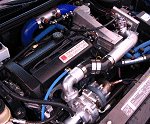

|
Street Class Unlimited Class
DOHC SOHC Ion Updated 1/05 For the most recent list of the fastest five cars click here. |
Horsepower vs TorqueBy: TitanVery few subjects can start a flame war on any message board like the question, which is better horsepower or torque? It seems as if everyone has opinions on how this question should be answered. With that in mind I decided to address this topic head on to help clarify everyone's understanding of this relationship. To start with we will define power. Power is the expression of
the energy expended over time. In mathematical form it looks like
this: Power = the change in Energy / the change in time Which can be manipulated into: Power = Force x Velocity And with a little more tweaking we get: Power = Torque x RPM Since we'll be referencing horsepower numbers our final equation looks like this: Horsepower = (Torque x RPM) / 5252 Since the mathematical aspect is not the main focus of this article from this point on we will direct our attention to understanding the relationship between horsepower and torque using the least amount of math possible. Variables definedTorque is a type of force that is applied about an axis or simply put; it's the measure of twist. Torque is what you feel when you accelerate and are pushed back into your seat. Furthermore, your car will accelerate at a rate that exactly matches the torque curve of the engine barring air and rolling resistance. Torque can be directly measured by a dyno whereas horsepower cannot. It is extremely important to understand that horsepower is never measured, it is a mathematical interpretation of torque over time. Let's consider this analogy of two different people each turning a crank that offers 100 pounds of resistance for every one turn. Person (A) can turn the crank one full revolution in one second whereas person (B) takes one minute to accomplish the same task. Both are equally strong (possess the same amount of torque) but person (A) possesses more power since it took him less time to turn the crank. Remember that power is defined as torque multiplied by time. Person (A) could theoretically turn the crank 60 times in one minute and plugging this into the equation we get: Equation: Power = Torque x RPM Person (A) Power = 100 x 60 Person (B) Power = 100 x 1 There is a huge difference between these two numbers and this is where RPM comes into play. As stated above both people possessed the same amount of torque to turn the crank but one could turn the crank a lot faster then the other. Using math we were able to find power output by measuring resistance provided by the crank (100 pounds) and the number of revolutions per minute it could be turned. Power was never measured in the example above. Consider the dyno graph below. If we were to look at a hypothetical engine that produced 50 foot pounds of torque (black line) at any rpm we would see that horsepower (red) increases at a steady slope. This liner relationship is due to the formula: Horsepower = (Torque x RPM) / 5252.
If we modify the torque curve by increasing it at 3000 and 8000rpm (green peaks shown above) then we would see a respective spike in the horsepower at the same rpm. What is interesting is that the horsepower spikes are not the same magnitude at the different rpms. The spike is greater at 8000rpms because of the torque x RPM part of the formula. At 3000rpms (a) horsepower increases by approximately 7 but at 8000rpms (b) the horsepower has increased by 19. Below are the two modified peaks represented mathematically. Equation: Horsepower = (Torque x RPM) / 5252. Point (a) Horsepower = (12.5 x 3000) / 5252 = 7.14 In both cases the torque values were increased by 12.5 and as you can see example (a) produced a smaller horsepower increase then (b) due to the differences in rpms. This suggests that torque elicits a greater effect on horsepower the further up in the rpm range you go. This can be attributed to the multiplication factor of rpms. Does that mean it's better to have torque at higher rpms? It all depends on what you want to do with your car but don't forget that gobs of torque at high rpms mean no torque at low rpms. Horsepower vs. torque is a give and take relationship and you can't have it all. How would we apply this to a Saturn or a FWD car for that matter? Well traction is our biggest limitation and Saturns are light cars which don't require much torque to get them moving. Besides torque low in the rpm tends to break parts pretty quickly. Our goal therefore should not be to produce a lot of torque low in the power band but to increase torque output further back in the power band. Hondas are in a similar situation. They lack a lot of bottom end grunt but come on strong at the top. Using this to their advantage they build their engines to enhance this trait. FWD cars are not traditionally quick cars but they can be very fast cars. If you can increase your power later in the power band once traction has been established that you can put more of the power to the ground. This theory is simple to understand but difficult to implement on a Saturn. We are constantly testing many new ideas and once we have solutions, TSN members will be the first to know. |
|




